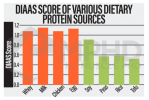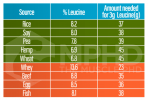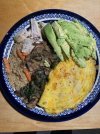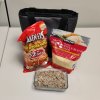Do you hit that magic number of 1g of protein per 1lbs of bodyweight a day?
No
Very few individual need to consume 1 gm per 1 lb of body weight a day.
Protein Intake
There are multiple studies on the amount of protein per pound or kilo of body weight.
One gram per pound is on the high end. This is more than most individual need, unless there is a good reason for it.
1.5 to 175 Gram Per Kilo of Body Weight
Many research articles indicate that this is a good range for most individuals; which I agree with.
Protein Per Serving
One of the key factors of ensuring muscle mass is maintained or increased is the amount of protein consumed per meal/serving
Research (Drs. Donald Layman and Layne Norton) determined that approximately
30 gram of quality protein per serving is required for younger individual to maintain and/or trigger an increase in muscle mass; younger meaning twenty's age group.
Older individual need to consume approximately 40 gram of quality protein per meal.
Layman Research
Layman found that most Americans only consume one meai a day that provide enough protein.
Thus, the lower consumption of protein in two meals a day means you are essentially starving your muscles.
That is the reason individual gradually lose muscle mass as they over time as they age.
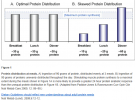
The amount Per Serving has to do with the...
Leucine: The Anabolic Amino Acid
Research (Norton and Layman) found that 30 to 40 gram Per Serving/Meal provide the optimal amount of Leucine.
Leucine is The Anabolic Amino Acid. It trigger mTOR (Mamallian Target of Rapamycin) which promotes muscle growth.
The determinate factor in the amount of Protein Per Serving is dependent on the...
Quality Protein
Meats, eggs, and dairy proteins are high quality protein.
Whey Protein contains the highest percentage of Leucine.
Vegetable Protein provide very little Leucine.
Another factor is...
Refractory Eating Period
Optimal Muscle Protein Synthesis for increasing muscle mass occurs when meals/serving of are 4 - 6 hour apart.
Muscle Protein Synthesis
This equates to an increase in muscle mass.
Muscles are similar to a Sponge.
When the sponge is dry is soaks up more water. When it is really wet is soaks up very little water.
The muscle repond in the same way. When meals or protein intake happens every 4-6 hours, the "Muscle Sponge" is dry, it soaks up and optimally used protein for maintaince and to build muscle.
100 Gram Per Day of Pertein
Based on your intake, breaking it up into three meals equally would yield 33 gram of proten per meal.
Based on your age, I'd suggest increasing your protein per meal to 40 gram of Quality Protein.
That because for older individuals (over twenty) to achieve the same anabolic response, they need a greater serving of Quatlity Protein.
I'm wondering if my nutrition isn't optimal for my strength training, but honestly I've been breaking personal records lately, and fairly consistently.
"Everything Works But Nothing Works Forever"
The underlying reason for this has to do with...
The Genearal Ada[tation Syndrome
This mean the body will eventually adapt to a diet or exercise program.
Once adaptation occurs, progress stops.
Since what you are doing is working, keep doing it. Once it stops working, you need to change something.
If It Ain't Broke, Break It
The essence of this book is for progress to occur in any area, experiment with new ideas and methods.
The Book's Take Home Message
1) Never be satisified.
2) Remain open to new concepts and method.
3) Be willing to experiment with them and find out. Be patient, there is a learning curve to anything new.
Personal Experience
I found a new training concept years ago. I tried it and put 50 lbs on my Deadlift in a year; I had a good Deadlift to begin with.
I then revised that program based on the training concept. In doing so, my Deadlift dropped 40 lbs the following year.
Balking A Cake
I re-examied my revised program. I determined that, like a cake, I had all the right ingredients.
The issue was how much of each ingredient to put into, metaphorically speaking, my "Training Cake".
I modified my "Training Ingrediens". In doing so, I regained the 50 lb to my Deadlift and increased it another 20 lbs; it was now 70 lb higher. It took me a year to figure it out.
The Take Home Message
Often the reason a program or method doesn't work is because individual don't perform it correctly.
Rather than accepting that it was them. they trash the program.
In working with a friend on a program, I showed and went over it with him.
I returned to see how he was doing. He said it wasn't working.
I went throught the program with him at the gym; only to find out the he had "Modified it to make it better".
Instead he turned it into something completely different. The fault was with him, not the program.



